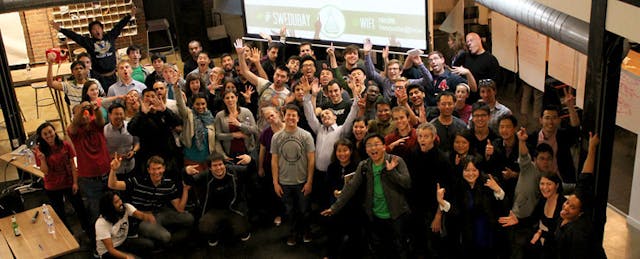For newbie edtech enthusiasts looking to get a taste of what it’s like to build a startup, there’s simply no better crash course than Startup Weekend EDU. (Of course, it was also a delight to see familiar faces that love the energy and excitement of these events as well.) Last weekend (Mar. 22-24), the creative chaos descended upon the pariSoma in San Francisco.
Susie Wise, K12 Lab Director at the Stanford d.School, kicked off the weekend by dropping some design thinking wisdom and challenging the nearly 100 teachers, developers, entrepreneurs and designers to make something that matters. The 54-hour whirlwind began with pitches from representatives from Teach for America, Caliber School, and Summit Public Schools, among over forty brave, enterprising souls. Ideas heard ranged from an online university for startups to gamified teacher training. Teachers had a chance to validate these ideas by voting on their favorite, and by the end of the evening teams were formed around the 14 that stood out the most.
Saturday was full of action for these teams, who got a big push from mentors to get outside and talk to users to validate their ideas. Henry Peng from Socrafund explained that their idea for microfunding classrooms "evolved several times over the weekend after getting feedback from teachers and mentors." Another team took a field trip to a nearby mall in search of teens to see if they’d be willing to pay for a college application helper.
Final presentations on Sunday drew a panel of familiar faces in the SF edtech scene who participated as judges: Michael Staton (Learn Capital), James Sanders (KIPP), Matt Pasternack (Clever), Jennifer Carolan (NewSchools Venture Fund), and Alan Louie (Imagine K12). Their pearls of wisdom for the presenting teams focused on three key elements of successful startups they’ve seen: defining an addressable market, paying more attention to distribution models, and focusing on customer research.
The Hello Visa team took the grand prize for a “TurboTax for student visas” to help immigrant students navigate the complicated issues involved with their legal status. It took the team some time to find focus. The idea began with the broad goal of gamifying legal education but, as team member Jerry Lee said, “finding a specific problem we could answer” was the key ingredient. Aside from praises from esteemed judges and bragging rights, the team scored two free plane tickets to New Orleans for a weekend training on applying the skills of empathy, unbundling, and prototyping to education, courtesy of 4.0 Schools.
Socrafund was awarded second place with a platform to help teachers microfund purchases for classroom needs. (It also won the Clever API Challenge--and Clever T-shirts--for making use of its API.) Third place went to Applsauce, an app that helps students build a timeline of their college application process.
It's amazing what can happen over a weekend in a room full of like-minded people focused on a single problem. For more details, check out the SF Startup Weekend EDU site or our Twitter feed.


